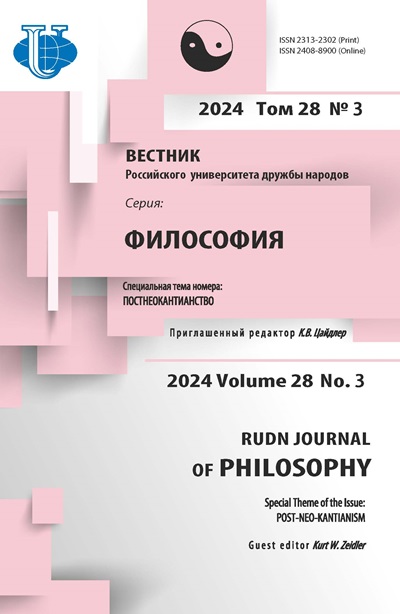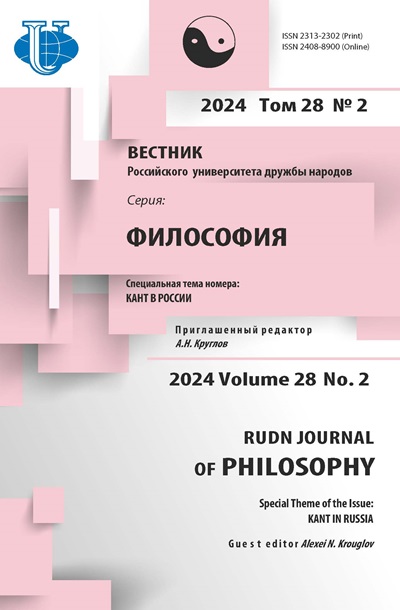“Asabiyya” as a Concept, Methodological Principle of Analysis of the Historical Process and the Theory of State Formation: Ibn al-Azraq
- Authors: Alyousef Shirin M.1
-
Affiliations:
- RUDN University
- Issue: Vol 28, No 2 (2024): KANT IN RUSSIA
- Pages: 420-433
- Section: HISTORY OF PHILOSOPHY
- URL: https://journals.rudn.ru/philosophy/article/view/39816
- DOI: https://doi.org/10.22363/2313-2302-2024-28-2-420-433
- EDN: https://elibrary.ru/VPYURM
Cite item
Full Text
Abstract
The research examines the concept of “Asabiyya”, its historical and semantic meaning, which goes back to the teachings of the outstanding Arab Muslim thinker Ibn Khaldun (1332-1406). Particular attention is paid to the understanding of Asabiyya as a methodological principle for analyzing the historical process, which is based on the idea of a special form of community of people. Asabiyya is the single basis for the existence of a certain mental reality on which this community is based, ensuring the maintenance and reproduction of social ties, that is, Asabiyya as a term can be considered as the personification of the high consciousness of unity, the unity of the tribal and consanguineous spirit that underlies social solidarity and group consciousness, blind adherence to this unity. Asabiyya as a theory of state formation by Ibn Khaldun's student Ibn al-Azraq (1427-1491) is seen as the main driving cyclical force of the historical process, which Ibn Khaldun first described for understanding the history of the Maghreb and North Africa. It is important to note that Ibn al-Azraq, in his political theory, considered the cyclical nature of Asabiyya as the main reason for the emergence, flourishing and decline of the state. A feature of the concept of the state of Ibn al-Azraq is that the historical cycles in it are not absolutely closed; therefore, there is the possibility of continuity between the dying and the new emerging dynasties. The founder of a new dynasty develops the customs and traditions of the previous one. In addition, the institutions of the state, in his opinion, will have to be updated and improved within the framework of continuity, provided that they still retain the basic forces for development, the most important of which is the power and authority of Asabiyya.
Keywords
About the authors
Mohamad Alyousef Shirin
RUDN University
Author for correspondence.
Email: shereen.alyusf@gmail.com
ORCID iD: 0009-0009-8115-0310
PhD Student, Department of History of Philosophy, Faculty of Humanities and Social Sciences
6 Miklukho-Maklaya St., 117198, Moscow, Russian FederationReferences
- Ibn al-Azraq. Miracles on the way, or the Nature of dominion (Badai al-sulk fi tabai al-mulk). Pt. 1. Al-Nashar Ali Sami, editor. Baghdad: Iraqi Ministry of Information; 1977. (In Arabic).
- Anvar Samatov. What is “Asabiyya” and why is this phenomenon prohibited by Islam? Available from: https://islam-today.ru/veroucenie/cto-takoeasabia-i-pocemu-eto-avlenie-zapreseno-islamom/ (accessed: 09.09.2023). (In Russian).
- Smirnov AV. Ibn Khaldun and his new science. In: History of philosophy yearbook. Vol. 2007. Moscow; 2008. P. 159‒186. (In Russian).
- Al-Jabri Muhammad Abed. Thought of Ibn Khaldun: Asabiyyah and the state. In: Center for Arab Unity Studies. Beirut; 1994. (In Arabic).
- Ibn Khaldun. Introduction. Tunisia: Tunisian Publishing House; 1984. (In Arabic).
- Rozov NS. Ibn Khaldun’s Law: what the growth of corruption and force coercion in Russia can lead to. In: Political class. 2006. N 16. Available from: http://www.nsu.ru/filf/rozov/publ/ibn-khaldun.htm (accessed: 11.10.2023). (In Russian).
- Saadalla Ali. The influence of Khaldunian thought on Ibn al-Azraq's approach and political views. In: Journal of Konstantinovsky University of Humanities. Algeria. 2001:69–84. (In Arabic).
- Pochta YuM. Islamic civilization in a globalizing world. Moscow: IMEMO RAS publ.; 2011. P. 84–87. (In Russian).
















